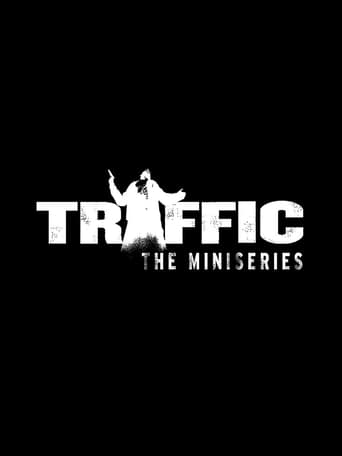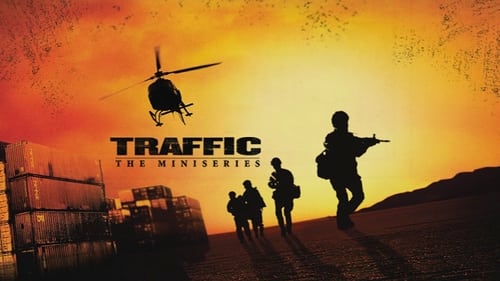George Parker
"Traffic" is a 4 hour TV miniseries which begins as an exposé of international narcotrafficking with stories developed on both the supply side (Afghanistan) and the demand side (Seattle). As the film spins its web of intrigues which include a DEA agent on a smuggling mission in Afghanistan, human trafficking, and even a possible terrorist attack on the US it develops side plots involving the DEA agent's family, the Seattle DEA office ops, an immigrant in search of family, corrupt traffickers at both ends of the smuggling corridor, and more. The result is a convoluted drama which continually cycles through it's many stories providing convenient mini flashbacks as audience reminders as it pulls it's separate parts together to show their interconnectedness and provide a sort of global overview of the problem of contraband smuggling and its effects on people. Overall the miniseries is well directed with good performances by a nominal cast, good production value, and a post 9/11 story with a terrorism angle. However, it is somewhat scattered, lacking cogency, fraught with loose ends and plot holes, and occasionally tests believability. Realists interested in narcotrafficking should check out "Traffik (1998)" first. (B)
Fred M. Hung
A drug bust goes bad in US occupied Afghanistan, a merchant marine boat is scuttled while smuggling illegal immigrants, and the bank forecloses on a Wharton MBA's insolvent real estate deal -- the first 50 pages of a new Clancy novel? No, these 3 completely nonsequitur events happen in the first half hour of Traffic: The Miniseries.Aside from the common theme of drugs, Traffic bears very little resemblance to Michael Douglas movie of the same name. That said, I was surprised by how engrossed I became in the plot. The miniseris is purely plot driven, with skin-deep characters provided to push the plot along. With 3 separate plot threads running concurrently, Traffic adeptly navigates the viewer through the labryinthine story with little confusion and much suspense.Noteworthy performances are Elias Koteas and Martin Donovan as 2 DEA agents charged with the sisyphean task of de-stabilizing the same Taliban drug operation they helped organize in the 80s. Koteas displays the same subdued heroism here as he did in Thin Red Line opposite Nick Nolte. Mary McCormack also shines as Koteas wife, not your typical damsel in distress.In the end, Traffic: the Miniseries is just a cool story, weaving narco-terrorism with Homeland Security. I would have enjoyed seeing this writ large a la HBO, bigger budget, better locales (Vancouver, BC doubles for everything from Seattle to Afghanistan), and stark dialogue. On HBO, Traffic would have been a true epic. On USA, it's a just a long stanza (Damn you, Barry Diller, spend some $$$!)
dglink
This three-night mini-series, which is derivative of the Steven Soderbergh movie Traffic, which in turn was adapted from a British mini-series Traffik, is entertaining, although it left a lot of loose ends fluttering in the wind, unless there is a Part II in production. While not a remake, the mini-series does use the same multi-character multi-plot structure as the Oscar winning film, but it lacks the star wattage of the theatrical movie. However, the less familiar faces actually work for the film and add to its gritty realistic quality. Also, while the theatrical film focused on drugs and Mexico, the mini-series is focused on drugs, illegals, terrorism, and Afghanistan. The first part sets up a series of seemingly unconnected story lines that grab the interest and carry the viewer into part two. The core of the plot emerges in part two and carries the multiple stories to resolution in part three, although several characters and their plot-lines seemed to fade away or drift off without a clear idea of their fates. Time should not have been a problem since there appeared to be some padding here and there as scenes were repeated unnecessarily to remind the viewer of what they had already seen. Tighter editing would have provided some additional running time to wrap up the plot and provide a more satisfying conclusion without cutting into advertising revenues. But, basically, Traffic: the Mini-Series is a good entertaining film, with some nice vistas of Canada standing in for Afghanistan, and some decent performances, although ultimately it will not result in a parade to the podium at the Emmys.
smokehill retrievers
I did enjoy most of the mini-series, though the overseas "DEA Cowboy" seQuences were just the usual Hollywood schlock, bearing no resemblance to overseas drug or other covert ops. I expect a bit of hokiness, but this was definitely in extremis and could have benefited from at least come consultant who had been there. At least then these characters could tell the difference between heroin and raw opium: the product they keep calling "heroin" in Afghanistan is obviously opium, which is indeed grown there but NEVER processed into heroin there.I'd probably have given this flick a good solid 8 as a pure action-adventure flick if it weren't for the abominable hack job obviously done to fit it into some magical six-hour block. Story arcs flew, and ended, at random, leaving bizarre loose ends all over the place. Obviously the junkie and the Tongs have some tie-in (as leverage for the DEA guy) that disappears entirely. And what really happens to "Ronnie?" Balthazar Getty obviously doesn't know, yet the Chechen basically kidnaps him, which will get him zilch, and then .....?? Ambiguity in endings is often fine, and this could have stood some, but this move just suddenly ended for no apparent reason. Obviously this was not for some artistic reason, it was just hacked to death by some idiot in one Hell of a hurry to make things fit. I think it's the most incompetent job of cutting I've ever seen anywhere, and it truly p***ed me off. This could have been a very good series if they'd given it the extra half hour it needed to sort out the subplots.




